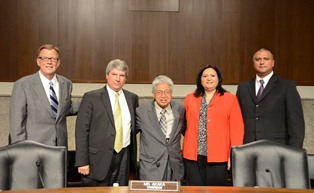WASHINGTON D.C. –
U.S. Senator Daniel K. Akaka (D-Hawaii), Chairman of the Senate Committee on Indian Affairs, held an oversight hearing on Regulation of Tribal Gaming: From Brick & Mortar to the Internet, yesterday.

“With these types of economic tools comes great responsibility. Tribes are the first-line regulators for tribal gaming. We in Congress – and especially on this Committee – also have a responsibility to ensure that tribal views and priorities are part of any legislation that could impact tribal gaming.”
Gene Johnson, Senior Vice President for Market Research and Online Studies in the Spectrum Gaming Group, noted the economic importance of the industry.
“Indian gaming is a major part of the land-based gambling industry, generating almost as much revenue as all U.S. commercial casinos. Tribes have demonstrated social benefits of land based gaming and I think that online gaming would only enhance their charitable operations–what they do to support their own people–and would make themselves independent of federal assistance,” Johnson said.
Jon Porter, Former Congressman and President of the Porter Gordon Silver Communications, highlighted the need to embrace technology.
“It’s clear that any industry which fails to embrace the Internet is doomed to failure. The time is now for the Congress and the Administration to bring laws and regulations into the 21st century,” Porter said.
Chairman Akaka insisted that Native communities be a priority when developing legislation that could affect their livelihood.
“In any expansion of gaming, we must make sure that the unique circumstances surrounding tribal sovereignty are maintained. And, we must also enable tribes to participate fully should any legislation be considered so tribes are on equal footing with the commercial gaming industry,” said Akaka.
Several Tribal leaders echoed Chairman Akaka’s sentiment.
Glen Gobin, Secretary of the Tulalip Tribes of Washington, said, “With Indian gaming representing over 40% of the gaming market, generating over $27.2 billion annually to this nation’s economy, not to mention all the jobs and economic benefits Indian gaming brings to some of the most impoverished areas in the Country, it is inconceivable with such sweeping changes in gaming being contemplated, that Tribes are not being consulted.”
Bruce “Two Dogs” Bozsum, Chairman of the Mohegan Tribe, said, “A federal system, developed with consultation and significant input from Tribes, will be the most effective way to safeguard Tribal sovereignty and ensure that exclusive Tribal gaming rights are not violated by states and commercial gaming operators anxious to cash in on an Internet gaming boom. Tribes cannot risk the hazards of a patchwork system defined by the best interests of the states, lotteries, and commercial gaming. With a federal system, we will have friends such as yourself and the Members of this Committee to fight to protect our Tribal rights throughout the process”
Jamie Hummingbird, Chairperson of the National Tribal Gaming Commissioners, said, “Any legislation considered at the federal level must provide parity to tribes by providing tribes and states equal treatment under any law that is enacted. By remaining at the forefront of innovation in gaming and gaming regulation, tribal gaming operations have become as sophisticated as any non-Indian gaming jurisdiction, if not more so. It is in this tradition of innovation and regulation that tribes will enter the digital realm of Internet gaming.”
In closing, Chairman Akaka said, “As always, it is our job on the Committee to make sure tribes achieve parity in any federal legislation and to amplify the voices of Native peoples so that their concerns are heard in the halls of Congress. That is why I have developed a draft online gaming bill – the Tribal Online Gaming Act of 2012. This bill is intended to further the dialogue with tribes, my colleagues here in the Senate, and other affected stakeholders.”
More information and an archived webcast is available on the committee’s website: LINK
-END-
Contact: Emily Deimel
Contact Phone: 202-224-3667
Contact E-mail: emily_deimel@indian.senate.gov
